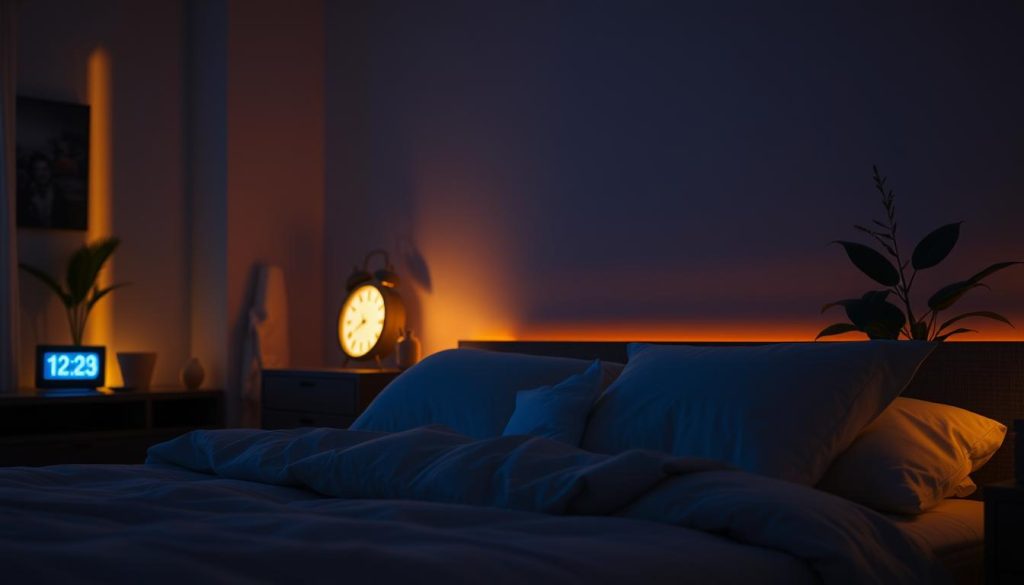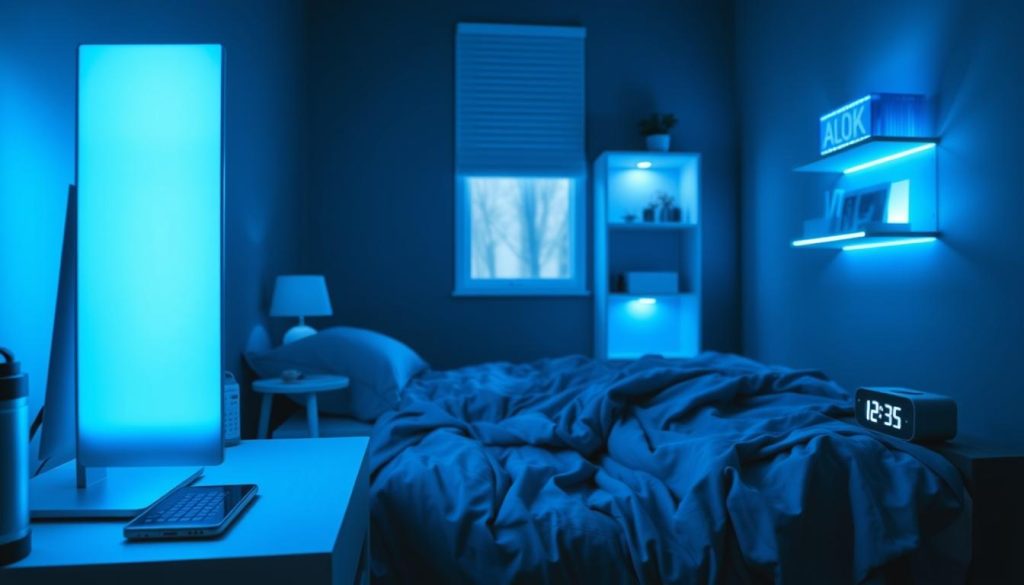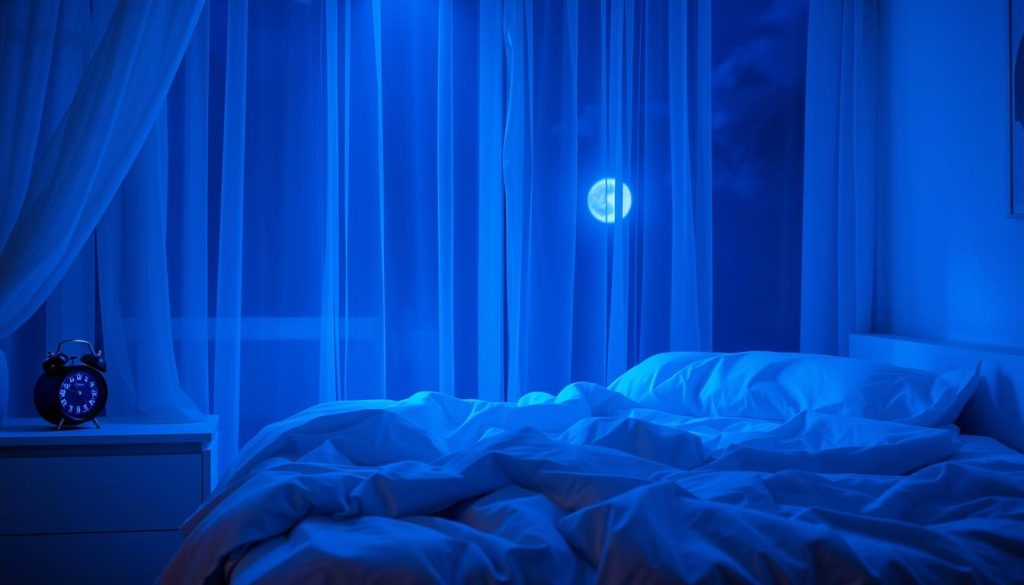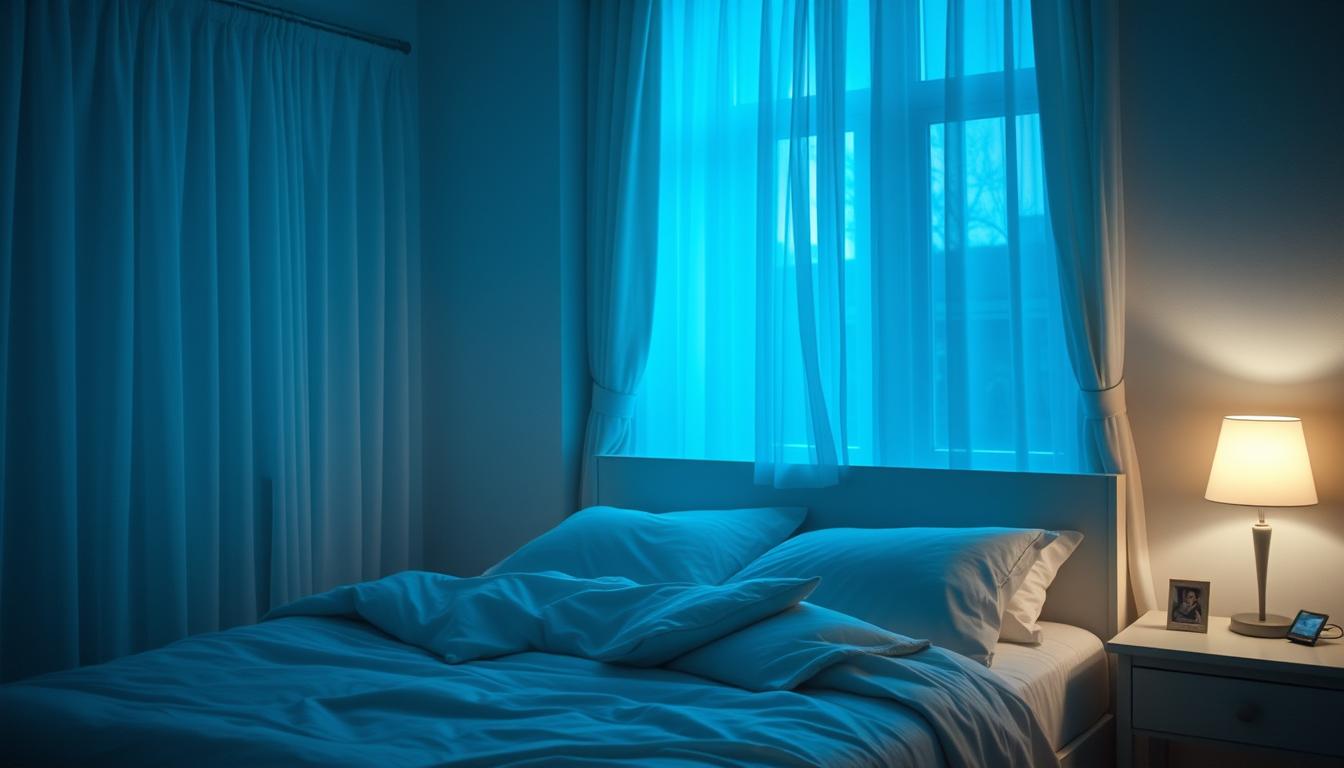We’ll explore the world of blue light and how it affects our sleep. In today’s digital world, we’re surrounded by blue light. Knowing how it impacts our sleep is key to getting good rest.
Our body has an internal clock, the circadian rhythm, tied to light and dark. Blue light in the evening messes with this balance. This can cause sleep problems. By learning about blue light and how to reduce it, we can sleep better and feel great.
Understanding the Impact of Blue Light on Sleep
Ever wondered why using your phone or laptop at night messes with your sleep? It’s because of blue light. This light is high-energy and comes from devices like phones, tablets, and computers.
What is Blue Light?
Blue light is a part of the visible light spectrum. It has a shorter wavelength and more energy than other light. This light can affect our sleep-wake cycle, or circadian rhythm.
How Blue Light Affects Our Circadian Rhythms
Our sleep-wake cycle is controlled by melatonin, a hormone. Blue light at night can lower melatonin levels. This makes it tough to fall and stay asleep. It can also harm our health and well-being.

Knowing how blue light affects our sleep helps us reduce exposure. We’ll look at blue light sources and how to make our sleep space better.
Sources of Blue Light Exposure
We are always around blue light sources, which can hurt our sleep. Our phones, tablets, computers, and TVs all give off blue light. Even some indoor lights, like LED bulbs, have a lot of blue light. Knowing where blue light comes from is key to better sleep.
Electronic Devices
Our electronic devices are a big source of blue light. Phones, tablets, laptops, and computers all have a lot of blue light. This can mess with our body clocks and lower melatonin levels. Using these devices before bed can really mess with our sleep.
LED Lighting
LED lights are another big source of blue light. Many indoor lights, like overheads and desk lamps, use LED bulbs. These bulbs give off more blue light than old bulbs. This blue light can make it hard to fall and stay asleep.
| Device or Lighting | Blue Light Emission |
|---|---|
| Smartphone | High |
| Tablet | High |
| Laptop | High |
| Computer Monitor | High |
| LED Lighting | High |
| Incandescent Bulbs | Low |
| Fluorescent Bulbs | Moderate |

By knowing where blue light comes from, we can reduce our exposure. This helps us sleep better. Next, we’ll look at how blue light affects sleep and why good sleep habits are important.
Blue Light and Its Consequences on Sleep Quality
Blue light before bed can really mess with our sleep. It stops our body from making melatonin. This hormone helps us sleep and wake up on time.
Melatonin Suppression
Melatonin is key for good sleep. Blue light makes our body make less of it. This makes it hard to fall and stay asleep.
This can cause trouble sleeping, poor sleep quality, and even insomnia.
Disrupted Sleep Cycles
Blue light messes with our natural sleep patterns. Our sleep cycles get broken and irregular. This leaves us feeling tired and sluggish during the day.
It’s important to know how blue light affects our sleep. By understanding its impact, we can find ways to sleep better. This improves our health and how we feel during the day.

Strategies to Minimize Blue Light Exposure
It’s important to cut down on blue light to sleep well. We can use a few easy ways to do this. One good method is to change how bright and colored our screens are.
Adjusting Screen Brightness and Color Temperatures
Lowering screen brightness and changing color to warmer tones helps a lot. Many devices have special settings or apps for this. It’s a simple step that helps our bodies make melatonin better.
We can also use blue light filters or screen protectors. These tools block blue light. They’re great for people who use screens a lot, like at work or play.
| Technique | Description | Benefits |
|---|---|---|
| Reduce Screen Brightness | Lower the overall brightness of your electronic devices | Decreases blue light exposure, supporting melatonin production and better sleep |
| Adjust Color Temperature | Shift the color temperature of your screens to a warmer, less blue-toned setting | Minimizes the impact of blue light on your circadian rhythms and sleep-wake cycle |
| Use Blue Light Filters | Employ screen protectors or apps that block a portion of the blue light spectrum | Provides an additional layer of protection against blue light exposure |
By using these simple steps, we can reduce blue light and improve our sleep. This helps us stay healthy too.
Blue Light-Blocking Glasses: A Solution for Better Sleep?
Blue light-blocking glasses are getting attention for better sleep. They filter out blue light, helping keep melatonin levels right. This supports better sleep quality.
These glasses block blue light, which is bad for sleep. They stop blue light from 400-500 nanometers. This light stops melatonin production, the sleep hormone.
The Effectiveness of Blue Light-Blocking Glasses
Studies show blue light glasses help sleep. They improve melatonin and sleep start. They also reduce tiredness and boost alertness.
They make sleep better and longer. This is great for those with lots of screen time before bed.
Choosing the Right Blue Light-Blocking Glasses
Choosing the right glasses is key. Look for good blue light blockage and clear lenses. They should be comfy too.
Make sure they block 400-500 nanometers of blue light. They shouldn’t mess with color or clarity. This helps with daily life.
Using blue light glasses can improve sleep and health. They help keep melatonin levels up. This leads to better, more restful sleep.
Creating a Sleep-Friendly Environment
Creating a calm bedtime routine is key for a good night’s sleep. It’s not just about avoiding blue light. A sleep-friendly environment can greatly improve our rest. By focusing on our sleeping space and habits before bed, we can make the perfect place for sleep.
Establishing a Relaxing Bedtime Routine
A bedtime routine tells our body it’s time to sleep. Here are some good things to do before bed:
- Taking a warm bath or shower to relax the body and mind
- Engaging in light stretching or gentle yoga to release tension
- Reading a book or listening to calming music
- Practicing relaxation techniques like deep breathing or meditation
- Avoiding stimulating activities like using electronic devices close to bedtime
Adding these calming activities to our routine helps us sleep better.
Optimizing the Sleep Environment
The look and feel of our bedroom also affects our sleep. To make a great sleep space, we should:
- Keep the bedroom cool, dark, and quiet for better sleep
- Use comfy, high-quality bedding for relaxation and support
- Don’t have TVs, laptops, or phones in the bedroom to avoid blue light
- Use blackout curtains or an eye mask to block out light
By making our bedroom and evening routines relaxing, we can sleep better.
The Importance of Healthy Sleep Habits
Getting enough sleep is key for our health. It makes us feel good and helps our body and mind. By cutting down on blue light, we can sleep better and feel great.
Keeping a regular sleep schedule is important. So is having a calm bedtime routine. And don’t forget to avoid blue light before bed. These steps help us sleep better and feel more alive.
Good sleep boosts our energy and brain power. It also makes us feel happier and helps our body fight off sickness. Plus, it’s good for our heart and metabolism.
Good sleep is a big deal for our health and happiness. Making small changes can make a big difference. Let’s focus on getting better sleep and feeling our best.

